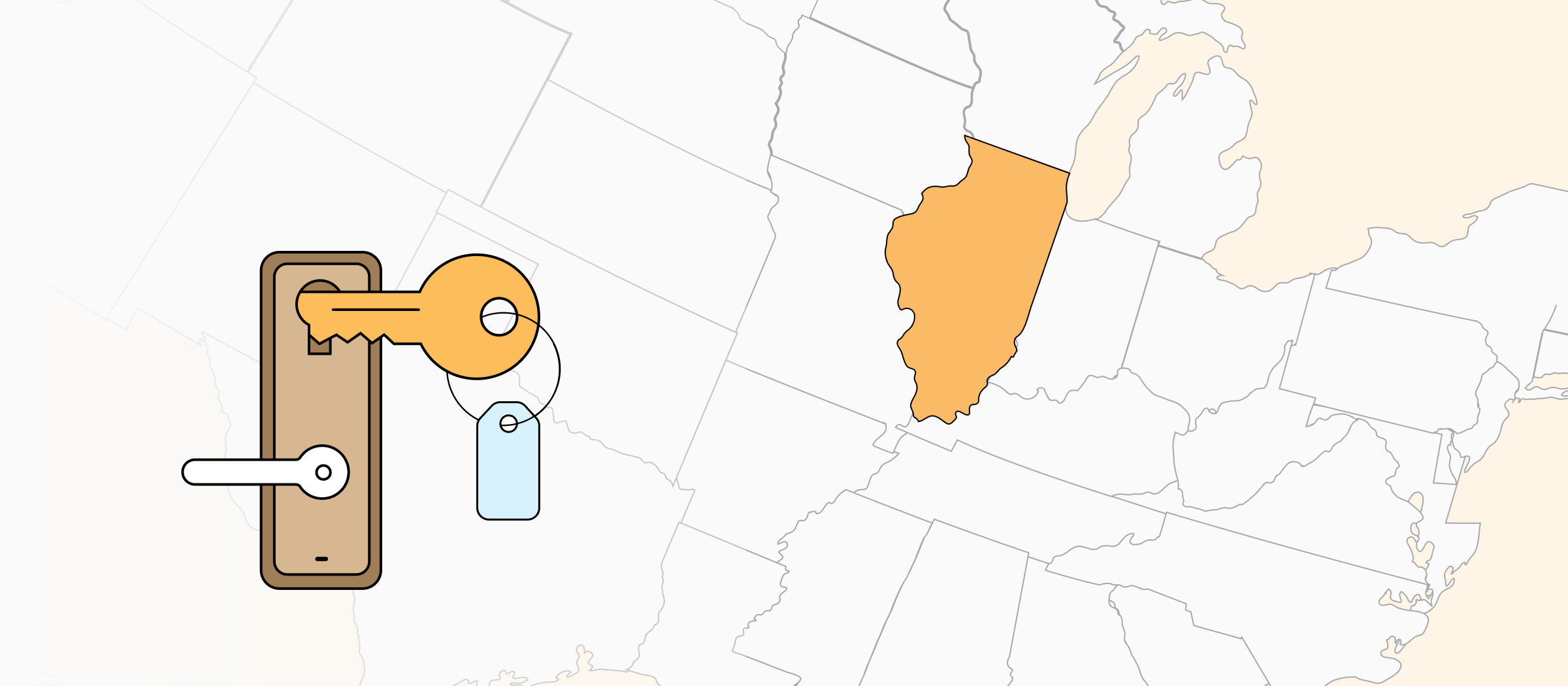| Legal Reasons for Entry |
|
| Notice Requirement |
|
| Penalties for Illegal Entry |
|
Does a Landlord Have the Right To Enter a Rental Property in Illinois?
Illinois landlords have the right to enter a rental property for the following reasons:
- Inspecting the property
- Maintenance and repairs
- Emergencies
Can a Landlord Enter Without Permission in Illinois?
Illinois landlords can legally enter a rental property without permission when there’s an emergency. In other cases, the tenant can refuse an unreasonable entry.
Can a Landlord Enter Without the Tenant Present in Illinois?
Illinois landlords can legally enter a rental property without the tenant present.
Can a Landlord Show a House While Occupied in Illinois?
Illinois landlords can show an occupied house, but only if this privilege is reserved in the lease. Otherwise, the landlord and the tenant have to negotiate on a case by case basis.
How Often Can Landlords Conduct Routine Inspections in Illinois?
Illinois landlords have no specific limit on how often they can enter for inspections. The landlord isn’t allowed to enter unreasonably often, but what’s reasonable gets decided case by case.
How Much Notice Does a Landlord Need To Provide in Illinois?
Illinois landlords are not subject to a specific requirement for advance notice. As a general rule, 24 hours is reasonable notice unless there’s a specific reason for another amount.
Can a Landlord Enter Without Notice in Illinois?
Illinois landlords don’t have to provide advance notice when entering for an allowed purpose, although repeated entries with no notice may violate the tenant’s right to quiet enjoyment of the premises.
How Can Landlords Notify Tenants of an Intention To Enter in Illinois?
Illinois landlords can notify tenants verbally or in writing about an intention to enter.
Can a Tenant Refuse Entry to a Landlord in Illinois?
Illinois tenants can refuse entry requests any time they believe in good faith that the entry is unreasonable (for example, if it’s for a showing of the property at 2:00 AM). However, if the landlord disagrees, he may give the tenant a ten-day Notice to Quit and attempt eviction.
What Happens If the Tenant Illegally Refuses Entry to the Landlord in Illinois?
Illinois landlords can deliver a ten-day Notice to Quit and attempt eviction against a tenant who illegally refuses entry.
Can a Tenant Change the Locks Without Permission in Illinois?
Illinois tenants can change locks without permission if the lease doesn’t say otherwise. Note that the landlord still has a right to enter for specific reasons, so it’s recommended that tenants provide copies of current keys.
What Can a Tenant Do If the Landlord Enters Illegally in Illinois?
Illinois tenants can sue for an injunction and monetary damages when the landlord enters illegally. The tenant could alternatively give the landlord a notice of violation, and then terminate the lease after 15 days if the landlord doesn’t correct the situation.
Sources
- 1 Prairie State Legal Services, Renter’s Handbook 41-42 (Jan. 2021 ed.)
-
There is no specific statute regarding landlord entry in Illinois. At common law, the tenant’s right of quiet enjoyment is absolute except as modified by other legal rights and obligations. In a residential context, landlords are required to maintain premises up to code and have a right to sell or relet the property as expedient. This generally means the landlord has a right to enter for purposes related to the tenancy, as long as the entry is reasonable and doesn’t disrupt the tenant’s privacy.
Non-authoritative guidance provided by a prominent Illinois tenant advocacy group articulates the general expectations:
=====
[T]he general rule is that the landlord may enter with reasonable notice during reasonable times of the day except in case of an emergency when he or she can enter at any time without notice. A local ordinance may limit the times or circumstances under which the landlord can enter, but there is no such state law. There also is no law defining the terms “reasonable notice” or “reasonable time” under the general rule, so you do not have much protection and disputes with the landlord can easily arise. Nonetheless, you do have some rights to privacy in your apartment or house… As a tenant, you are entitled to possession of the premises and your landlord cannot interfere unreasonably with your use and enjoyment of the premises.
Source Link - 2 735 ILCS 5/9-210 (2022)
-
“When default is made in any of the terms of a lease, it is not necessary to give more than 10 days’ notice to quit, or of the termination of such tenancy, and the same may be terminated on giving such notice to quit at any time after such default in any of the terms of such lease. Such notice may be substantially in the following form: ‘To A.B.: You are hereby notified that in consequence of your default in (here insert the character of the default) of the premises now occupied by you, being, etc., (here describe the premises) I have elected to terminate your lease, and you are hereby notified to quit and deliver up possession of the same to me within 10 days of this date (dated, etc.).’ The notice is to be signed by the lessor or his or her agent, and no other notice or demand of possession or termination of such tenancy is necessary.”
Source Link - 3 American National Bank v. Powell, 293 Ill. App. 3d 1033, 1039 (Ill. App. Ct. 1997)
-
“Before terminating the lease, the tenant must provide the landlord, and the landlord must receive, two written notices: the written notice of the violation, and the written notice of the termination after 15 days.”
Source Link

